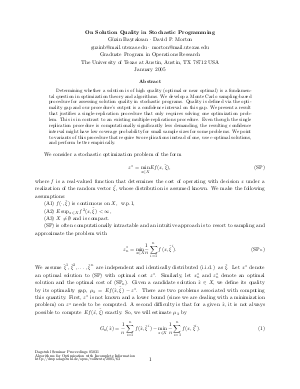Assessing Solution Quality in Stochastic Programs
Authors David P. Morton, Guzin Bayraksan
-
Part of:
Volume:
Dagstuhl Seminar Proceedings, Volume 5031
Part of: Series: Dagstuhl Seminar Proceedings (DagSemProc) - License:
 Creative Commons Attribution 4.0 International license
Creative Commons Attribution 4.0 International license
- Publication Date: 2005-05-30
File

PDF
DagSemProc.05031.6.pdf
- Filesize: 172 kB
- 3 pages
Document Identifiers
Subject Classification
Keywords
- stochastic programming
- Monte Carlo simulation
Metrics
- Access Statistics
-
Total Accesses (updated on a weekly basis)
0PDF Downloads0Metadata Views
Abstract
Assessing whether a solution is of high quality (optimal or near optimal) is a fundamental question in optimization. We develop Monte Carlo sampling-based procedures for assessing solution quality in stochastic programs. Quality is defined via the optimality gap and our procedures' output is a confidence interval on this gap. We review a multiple-replications procedure and then present a result that justifies a computationally simplified single-replication procedure. Even though the single replication procedure is computationally significantly less demanding, the resulting confidence interval may have low coverage for small sample sizes on some problems. We provide variants of this procedure and provide preliminary guidelines for selecting a candidate solution. Both are designed to improve the basic procedure's performance.
Cite As Get BibTex
David P. Morton and Guzin Bayraksan. Assessing Solution Quality in Stochastic Programs. In Algorithms for Optimization with Incomplete Information. Dagstuhl Seminar Proceedings, Volume 5031, pp. 1-3, Schloss Dagstuhl – Leibniz-Zentrum für Informatik (2005)
https://doi.org/10.4230/DagSemProc.05031.6
BibTex
@InProceedings{morton_et_al:DagSemProc.05031.6,
author = {Morton, David P. and Bayraksan, Guzin},
title = {{Assessing Solution Quality in Stochastic Programs}},
booktitle = {Algorithms for Optimization with Incomplete Information},
pages = {1--3},
series = {Dagstuhl Seminar Proceedings (DagSemProc)},
ISSN = {1862-4405},
year = {2005},
volume = {5031},
editor = {Susanne Albers and Rolf H. M\"{o}hring and Georg Ch. Pflug and R\"{u}diger Schultz},
publisher = {Schloss Dagstuhl -- Leibniz-Zentrum f{\"u}r Informatik},
address = {Dagstuhl, Germany},
URL = {https://drops.dagstuhl.de/entities/document/10.4230/DagSemProc.05031.6},
URN = {urn:nbn:de:0030-drops-638},
doi = {10.4230/DagSemProc.05031.6},
annote = {Keywords: stochastic programming , Monte Carlo simulation}
}
